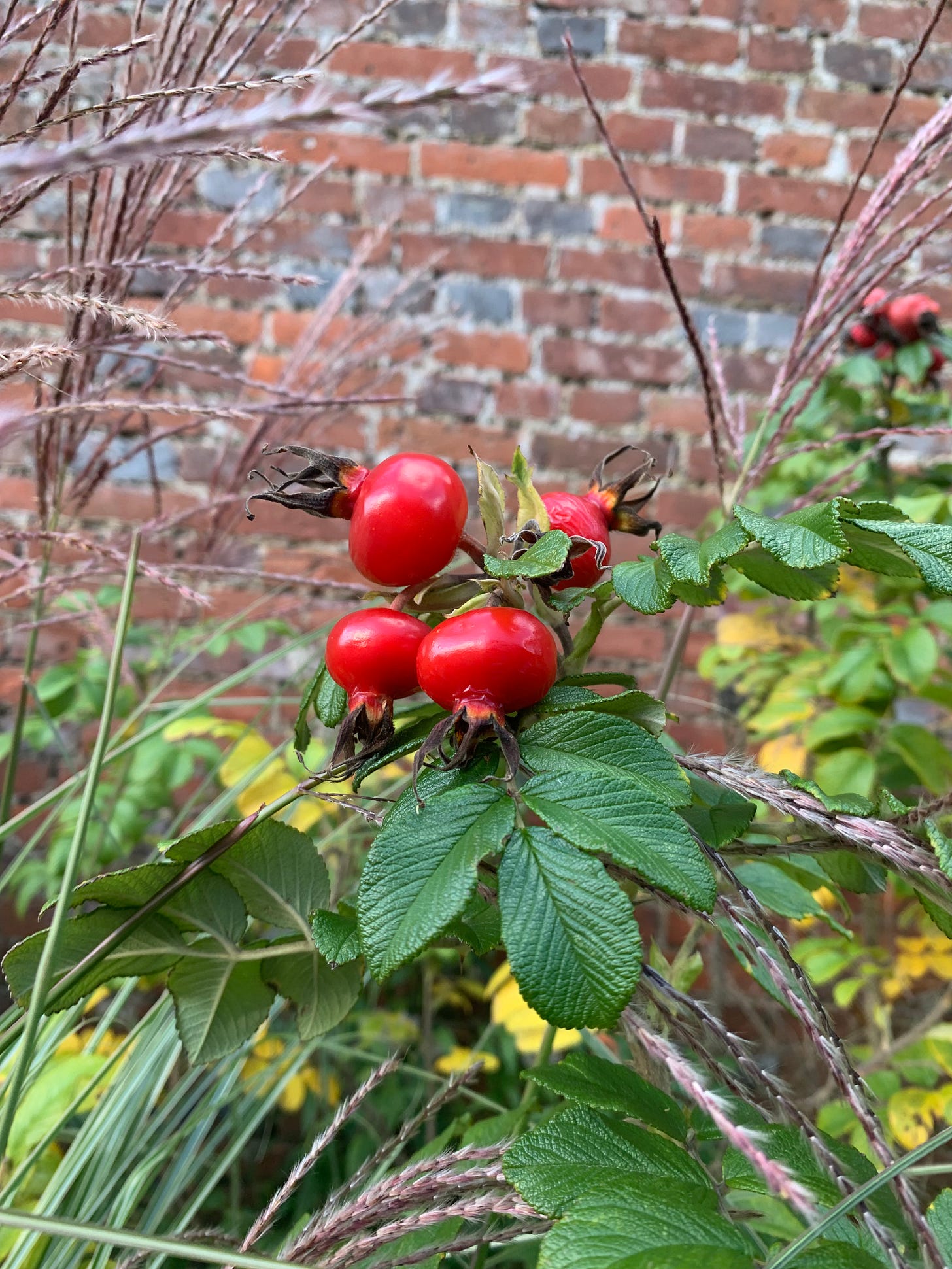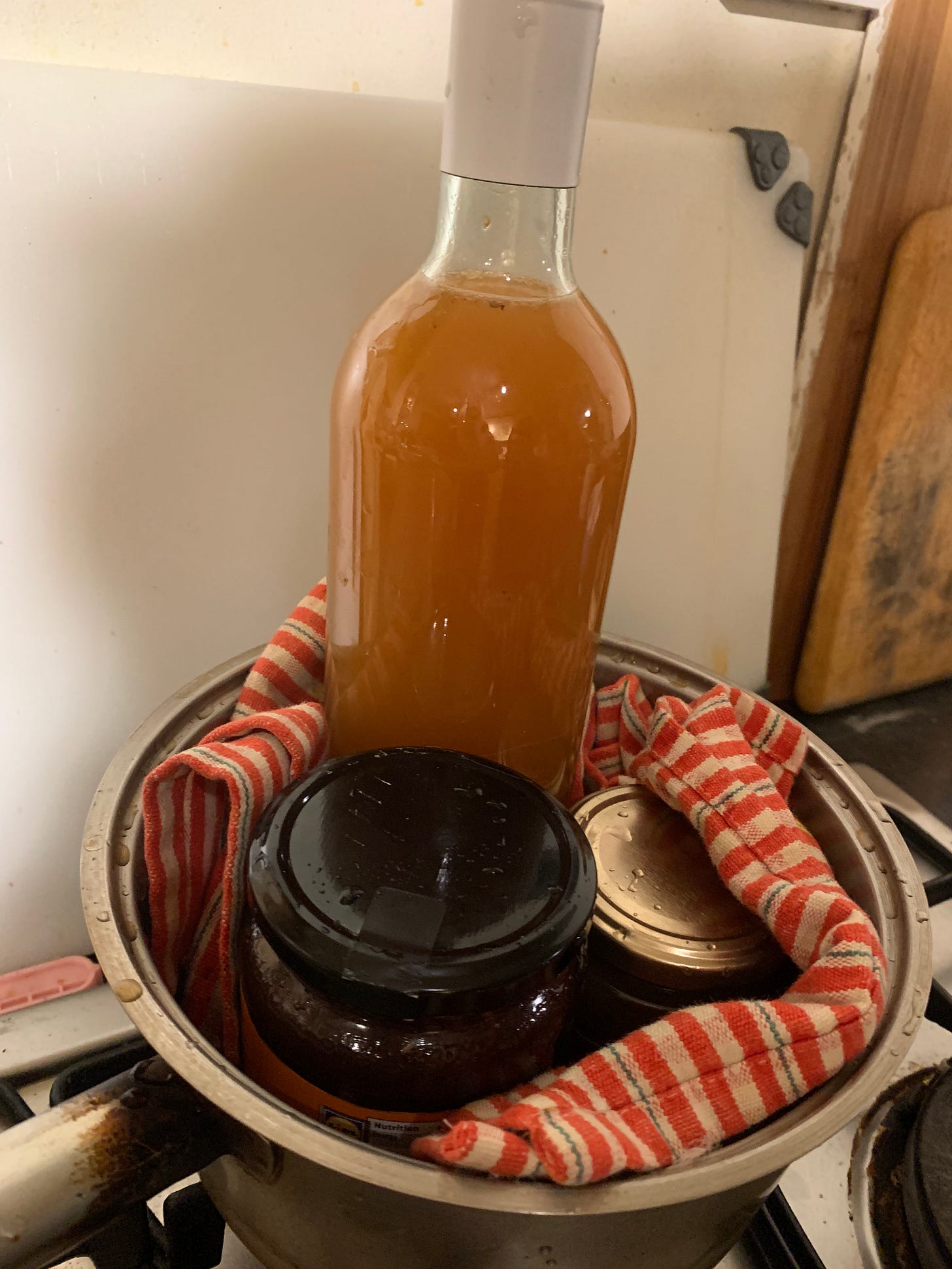Naked truth Chapter 12 Russian and Russia through Martha's eyes
The language in which I've never been bullied or hurt and rosehip syrup to soothe a tender soul

JUST A LANGUAGE?
Language. What is held within a language? You might say it’s a mosaic of memories: snapshots of life, family moments, shoutings, friends, teachers, all kinds of interactions, books, jobs, mentors, hospitals, cemeteries, priests, boyfriends, favorite actors, movies, and more.
Martha takes a sip of her new rosehip syrup. She likes to sip tiny drops, right beside her coffee—delicious! And suddenly, she’s transported to Pushkin, a charming village in Russia, to Tsarskoye Selo, where Catherine the Great had her beloved palace. She can almost feel the air, sense the earth underfoot as she strolls through the park with her dear uncle Serioja, getting close to the lake, holding a butterfly catcher in her hand. She remembers it was yellow! From this memory, a wave of warmth fills her, a longing to be back in that world, surrounded by the language she loves so deeply.
Back in the present, Martha picks up her iPhone and searches for one of her favorite Russian films. The familiar rhythm and sounds soothe her soul, and she realizes that Russian is the only language that holds only good memories for her, untouched by long-term hurt, abuse or pain. It’s her safe place—her sacred, soul-healing space.
RUSSIAN
Russian was taught in her school from year 5 through year 8, adding to her overall learning experience. Yet, around 90% of her classmates showed little interest, doing just enough to pass. This attitude reflected Romanians' historical and political sentiments toward Russia, with children often mirroring their parents' views. For her, though, it was different.
MR NOVEANU
Martha sends warm thoughts to her Russian teacher, Mr. Noveanu, a kind-eyed man with a short beard, his presence both handsome and gentle. He was in his late 50s, perhaps early 60s, when Martha met him at age 14 in college. During their first class, he asked if anyone had any connection with Russia or had learned Russian before. Martha raised her hand and shared that her mother was Russian, and she knew a bit of the language. At the mention of “a bit,” his eyes lit up, widening with interest.
His interest came from two directions: first, the fact that she was half Russian, and second, the “bit” of Russian she mentioned knowing. He expected Martha to be fluent—a reasonable assumption, but far from the reality.
Mr. Noveanu was the catalyst—the person to whom Martha owes her proficiency in Russian. He sparked in her a deep desire to understand the culture, inspiring her to go the extra mile and make up for the years she could have spent studying more.
The Ferret never spoke Russian with Martha, despite her father also being fluent in the language. When Martha asked her why, she explained that her boss had told her Martha might develop a Russian accent when speaking Romanian, which wouldn’t be good for her future. Why she believed this and took such a strange piece of advice to heart, no one could understand.
On the few trips to Russia that Martha took, she was able to pick up a few words here and there. The books gifted by her relatives also helped her learn the alphabet and start writing, fuelled by her own curiosity and desire to do so. The truth is that ever since she was little, Martha had to write the Christmas cards to her Russian relatives. At first, she would copy the words from the previous year’s cards arriving from Russia, but a few years later, she began forming her own words and sentences.
RUSSIAN MAGAZINES
Back in those days, the Ferret subscribed to a few Russian magazines, which made a huge difference to Martha’s learning progress. The magazines were so interesting, with colorful pictures, and she adored them. One of the highlights of the month was going to the post office to pick up the small parcel of magazines that arrived from Russia. In those days, Romanians could subscribe to Russian magazines at the post office. It was such a blessing and an incredible help in how the language grew into her soul.
One of them was called "Around the World", and another was "The Little Fire." At the end of “Around the World” there was a pen pal section, and for years she wrote to and received letters from an Indian boy and an American woman. It was such a fantastic way to learn about new countries, different customs, family relationships, and stories from such diverse environments, as well as receiving beautiful cards. Could it be that this was when the seeds of writing were planted?
There were a few important moments connected to Russian, moments Martha remembers clearly!
ROMEXPO
Every year at ROMEXPO, the largest exhibition center, major commercial events took place! Hundreds of stands were set up, showcasing companies from all over the world, from agricultural machinery to cosmetics, sweets, clothing, and more.
People from all over Romania came to visit—not only for work but also as curious visitors eager to see what was new and experience foreign goods. Schools organized day trips for students, too, giving teachers the tricky task of ensuring they returned with the same number of students they’d started with.

Martha loved attending this event, though it’s unclear if she went with other children or on her own. Her memory is hazy for much of those years. But she clearly remembers attending a short talk organized by the Russian Cultural Center at one of these events. They spoke about their activities, and Martha was suddenly all ears. They mentioned a library of Russian books located just across from the Russian Embassy, in one of Bucharest's most beautiful old neighborhoods, still exuding the charm and elegance of the golden era.
Although very shy, Martha raised her hand at the end of the event and asked a question in Russian. This led to an open invitation to visit one of the Russian cultural offices in central Bucharest.
Martha must have been 12 or 13, perhaps younger. This marked the beginning of a delightful series of visits to the center, where small gatherings focused on literature, poetry, and movies, all enjoyed around a traditional samovar and delicious Russian sweets.
The events were typically held in the late afternoons and early evenings. At that time, she traveled all over Bucharest alone, without fear.
Martha invited her mother to come along, but "The Ferret" always declined.
During one of the gatherings, rose-hip syrup was served alongside delicious Russian pancakes made with kefir. Years later, she decided to make her own rose-hip syrup—a skill forever tied to Aunt Raise, who, like many Russians, was incredibly talented at using nature's gifts to create delicious and healthy potions.
ROSEHIP SYRUP
It could very well be that my peasant roots are nowadays more and more activated. Making my own potions using natural fruits, foraging is something I have a deep connection with.
October, November are ideal times to collect rosehips in my part of the world. I always have a plastic bag in my rucksack just in case I can pick a few more. Usually I put them in the freezer and use whenever I want or have time.
The other day, I made a batch of rosehip syrup I highly recommend you to do the same. It helps your immune system and it is a delicious natural drink free from all sorts of unusual names and letters.
Here's a simple and traditional recipe for making rosehip syrup—a vitamin-rich, immune-boosting syrup that’s perfect for autumn and winter!
Rosehip Syrup Recipe
Ingredients:
-0.5 kg rosehips (frozen or fresh)
-1 liter (4 cups) water
- 250 g (1 cups) sugar (adjust to taste)
Instructions:
1. Prepare the Rosehips
Rinse the rosehips well and trim off any stems. For faster cooking and better extraction, chop the rosehips roughly, or if you prefer, you can leave them whole.
2. Boil the Rosehips
In a large pot, add the rosehips and cover them with water (about 1 liter to start). Bring to a boil, then reduce the heat and simmer gently for about 15–20 minutes, or until the rosehips are soft. Use a potato masher to gently crush them as they soften.
3. Strain the Mixture
Remove the pot from heat. Pour the rosehip mixture through a fine mesh sieve or a muslin cloth, catching the liquid in a large bowl or another pot. You can press down to extract as much liquid as possible. Repeat the process by adding the strained pulp back to the pot with 300ml water, simmering, and straining again to extract more juice.
4. Combine and Sweeten
Pour the combined strained liquid back into a clean pot. Add the sugar, stirring over low heat until it dissolves. Then bring the syrup to a gentle boil for about 5–10 minutes, allowing it to thicken slightly. Adjust the sweetness to your preference.
5. Bottle and Store
Pour the hot syrup into sterilized bottles or jars, leaving a bit of space at the top. Seal tightly. The syrup can be stored in the fridge for up to 2–3 months.
How to Use Rosehip Syrup:
- Mix a spoonful into hot water or tea as a soothing drink.
- Add to smoothies, yogurt, or desserts.
- Drizzle over pancakes or porridge for a vitamin C boost!
End of Chapter 12
One of my dreams is to write a novel, inspired by real events but with a touch of fiction in it. Will it happen? I don’t know! Writing as and when I find the energy and time while navigating the choppy waters of life.
If you find value here, please consider supporting my work by becoming a paid subscriber or you can Buy me a coffee . Also please share with other like minded people.







Karina,
I have no relatives in Russia but felt always the culture close to me. I spent on year in Moscow at the KGB school.
I missed my wife left at home with my three year old daughter and my just born son. I spoke a pretty good Russian. Later on international events in Hungary or even in the States I was frequently asked to interpret between Russian and English. I enjoyed being the "bridge".
I will write about my "scholarship". My urge was to tolerate the dogmatic old guard, while cherish the friendship with the smart younger ones.
No contact remained after 52 years with any of them, and my Russian is deeply rusted, to say the best.
Last night I listened to Chaikovskiy's violin concerto played by Russian virtuoso Vengerov. ( his name means Hungarian in Russian)
That you have such a deep feeling for Russian and Russia is no surprise. As your early years unfold in your Soul to Soul stories it is clear that your extended family in Russia is the only family you have ever really known and allowed into the space in your memory reserved for happiness. The tragedy of Europe is that Russia is a part of who we are. The richness of its culture sits comfortably with the classical cultures of Western Europe, its love of sports is repeated everywhere along the Atlantic coastline, the ability of Russian young to party is matched as equals by the young of Western Europe, and so the similarities go on and on. It is a tragedy that forces outside Europe have conspired to separate us. P